
 Flash News
Flash News
Photo/ Brawl at a counting center in Kukës, police try to stop the young man
The first ballot box is counted in Tirana, the DP leads in Unit 2
5 ballot boxes are being counted in the Gjirokastra district, here's how the votes are divided
The first 6 ballot boxes are opened for counting in Kukës
Figures from the CEC are out: 42.16% of Albanians within the country voted in the parliamentary elections
The elections that have not given hope, this time again more than half are not expected to vote
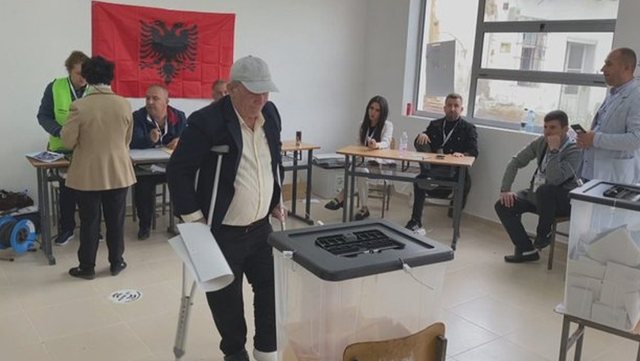
On May 11, Albania will hold democratic elections for the 11th time since the fall of the totalitarian regime, but the political forces that have led the country in these 34 years have not been effective in building a state that offers security, hope, and development to its citizens.
Economic growth has been stable, but its results in reducing poverty and inequality have been weak.
The latest Eurostat data shows that Albania has around 42% of the population at risk of being poor, the highest level in Europe, while the latest World Bank report showed that more than 80% of Albanians think that economic inequality has increased, the highest percentage in the region.
The lack of a vision for long-term development has had serious consequences for demographic developments. The United Nations has ranked Albania on the top list of countries with high emigration, especially among young people, in the last decade.
This mass exodus has made voter registration fictitious. For example, in the 2021 general parliamentary elections, there were 3,588,869 people registered as eligible to vote, but 1,614,048 people or only 46.3% went to the polls, the lowest turnout since 1992.
More than indifference to political developments, the low turnout is justified by the fact that nearly half of Albanians with the right to vote live abroad.
While the country's population is shrinking, the number of people with voting rights is fictitiously increasing, as a good portion of Albanian immigrants are still present in the civil status registers.
In the 2021 parliamentary elections, the number of voters was 9.7% higher than in the 2013 elections, but those who voted were 5% fewer than in 2013.
3,713,761 people are eligible to vote in these elections, or 3.5% more than in 2021.
High emigration has reduced voter turnout. From over 90% turnout in the 1990s, in 2021 Albania had only 46.3%, ranking us among the countries with the lowest voter turnout in the region.
Albania has entered a phase of demographic contraction, with an increasing median age and a decreasing natural population growth rate. Young voters are less motivated to vote, while a large proportion of young people emigrate shortly after the age of 18. These developments have led to a decrease in real participation and a weakening of the influence of the younger generation in politics.
Innovation from diaspora votes
According to the final list published by the Ministry of Interior, the total number of Albanian citizens eligible to vote in the May 11, 2025 elections is 3,713,761.
For the first time, Albanians living abroad will have the opportunity to vote in the parliamentary elections. According to the Central Election Commission, 245,935 Albanian citizens abroad have registered.
This time, a regional proportional electoral system with partial open lists is being applied, which was adopted after amendments to the Electoral Code in July 2024. In this system, one third of the candidates are on closed lists and are appointed by party leaders. While two thirds are open and voters can express their preferences for candidates.
According to data from the CEC, 26% of registered voters from the diaspora are from Italy, 29.7% from Germany and 10% from Greece. Tirana has the largest number of registered Albanians from the diaspora with approximately 75 thousand people or 30% of the total, followed by Fier, Elbasan and Durrës.
Envelopes with diaspora votes had better returns in Germany due to better postal infrastructure, while Greece had a slower pace due to delays in parcel delivery.
The highest impact of diaspora votes will be in large districts such as Tirana, Fier, Elbasan and Durrës, where the diaspora can decide 19-20 mandates. The envelope must arrive at the CEC no later than 19:00, May 11, 2025.
Many Albanians in emigration do not have an official address or are not equipped with the proper documentation.
Registration is not automated, which has significantly reduced turnout. If the entire registered diaspora were to vote, they would constitute 7% of the national total. But due to the low number of registered voters and logistical obstacles, the real impact on these elections is expected to be very limited.
In the fourth decade of transition, politics has not offered a solution to curb mass emigration. The country has lost almost 40% of its population since the 1990s and is among the fastest aging countries in Europe, while there is no supportive policy for youth. Corruption remains the biggest perceived problem, according to reports by the EU and Transparency International.
Scandals, boycotts, and the lack of real political alternatives have eroded citizens' faith in democracy.
Albania is awaiting the opening of negotiation chapters with the EU, but the conditions for reform in justice, media and public administration remain unfulfilled./ MONITOR
Latest news




Photo/ Brawl at a counting center in Kukës, police try to stop the young man
2025-05-12 01:04:32
The first ballot box is counted in Tirana, the DP leads in Unit 2
2025-05-12 00:56:22



Vote counting begins in Mirdita
2025-05-12 00:25:21

Noka accuses Balla: His bags will be separated! I will monitor every vote
2025-05-12 00:01:41
Journalist: Patronage agents who took voters and took them to vote
2025-05-11 23:49:19


The first 6 ballot boxes are opened for counting in Kukës
2025-05-11 23:22:21


Celibashi with foreign observers arrives at the Olympic Park for Diaspora votes
2025-05-11 22:56:36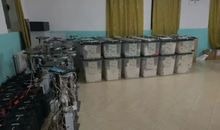
The first 3 boxes in Pustec are counted, how the result is presented
2025-05-11 22:53:25

Helena, as Rama's tool to attack the CEC
2025-05-11 22:31:34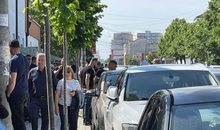
Organized crime "oriented" the vote in Durrës
2025-05-11 22:21:32
Albania is a very strange place.
2025-05-11 22:11:51


Meta: The drug state is giving up, it cannot stop the people's victory
2025-05-11 21:41:12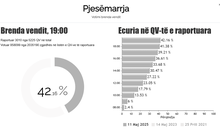

Rape of commissioner and his family in Pogradec, 4 more wanted citizens arrested
2025-05-11 21:24:36
Vote counting begins in Pustec, including diaspora votes
2025-05-11 21:11:22

Tension at the shelter of patronage activists, police escort 3 people
2025-05-11 20:56:33
Berisha accuses PS: After "Petro Nini" illegal office also in Astir
2025-05-11 20:56:30



First ballot box counted in Vora, DP leads in Domje
2025-05-11 20:22:06


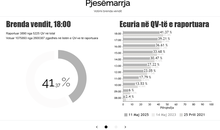
Dibra records record turnout in elections, Vlora least interested
2025-05-11 19:43:00




Police intervene at the office of the patronage workers in Tirana
2025-05-11 19:18:52
Elections 2025, voting hours officially end
2025-05-11 19:05:14

Elections 2025: Law for one party, tolerance for the other
2025-05-11 18:46:14

OSCE-ODIHR observers monitor the voting process in Saranda
2025-05-11 18:22:13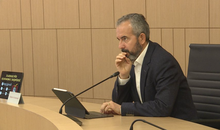
SP's request to postpone voting hours in Vlora fails at CEC meeting
2025-05-11 18:13:04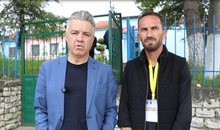
Bozdo: Go out and vote, your will will be unchangeable!
2025-05-11 18:00:38
A word of advice for government thugs
2025-05-11 17:52:40
Accident on the Korça - Pogradec axis, two injured near the village of Pirg
2025-05-11 17:50:14


Another person arrested for photographing the vote in Elbasan County
2025-05-11 17:27:53

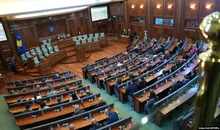


Electoral crimes/ Xibra administrator and a person from Klosi reported to SPAK
2025-05-11 16:55:01
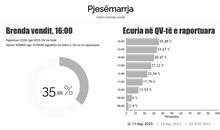
Parliamentary Elections 2025/ National turnout by 4:00 PM reaches 35.88%
2025-05-11 16:45:24
Conflict in Fushë-Milot, police issue statement: No shell casings found
2025-05-11 16:42:20
The brother of the SP candidate in Belsh intimidates voters
2025-05-11 16:24:53

Clashes in Vore CEAZ, CEC revokes observers' accreditation
2025-05-11 16:15:41

These fruits and vegetables remove toxins from the liver
2025-05-11 16:03:45
Elections 2025/ Diaspora votes massively, participation until 3:00 PM
2025-05-11 15:59:13
Fight at a polling station in Fushë-Milot, gunshots fired
2025-05-11 15:56:15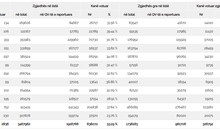
Figures/ Vlora, the region with the lowest voter turnout
2025-05-11 15:37:55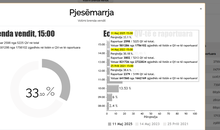
Elections 2025/ What was the voter turnout until 3:00 PM?
2025-05-11 15:32:37
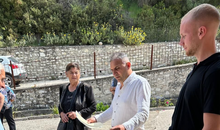
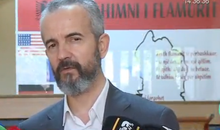
Celibashi: Photographing votes is punishable by 3 years in prison
2025-05-11 15:13:50
Erion Veliaj votes in the Durrës detention center
2025-05-11 14:59:57



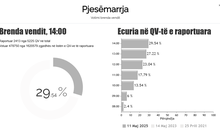
Low turnout, CEC releases figures: How many citizens have voted by 2:00 PM
2025-05-11 14:31:11
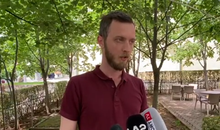
Citizens from Kosovo vote in Kukës
2025-05-11 14:11:33
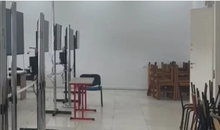
The electoral process in Librazhd is interrupted, a person photographed the vote
2025-05-11 13:54:30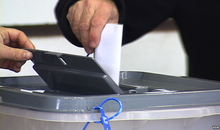

Celibashi: 8% of polling stations opened late
2025-05-11 13:47:12
Tragic accident in Peshkopi, police officer Veli Gjura dies at Trauma Hospital
2025-05-11 13:43:02

Berisha on vote alienation: Whoever violates the law will be held responsible
2025-05-11 13:26:47
CEC: Voter turnout until 12:00, lower than in 2021
2025-05-11 13:00:45


Bride votes before going to wedding in Elbasan: Democracy before the ceremony
2025-05-11 12:41:23

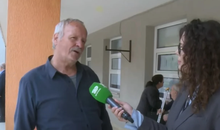
Unprecedented! 101-year-old woman in Fier is not allowed to vote
2025-05-11 12:15:06
